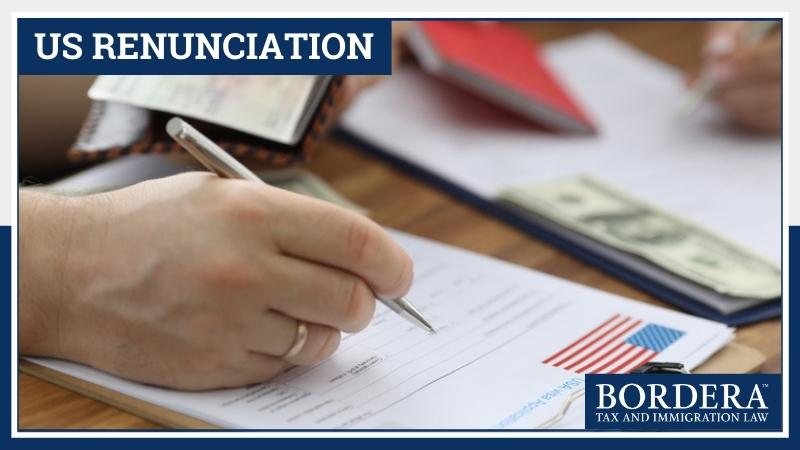
Renouncing U.S. citizenship isn’t as simple as surrendering your passport—it comes with legal and tax consequences. If you're in Calgary or Edmonton and considering this step, you may face the U.S. exit tax, Form 8854 filing, and IRS compliance issues. Many Accidental Americans and U.S. expats in Canada are surprised by the financial impact of renunciation, including the covered expatriate status and ongoing tax obligations. At Bordera Tax and Immigration Law, we help individuals navigate the complex process of U.S. citizenship renunciation in Canada with expert legal and tax guidance. Don’t risk penalties or unexpected tax bills—contact us today for a consultation and ensure a smooth transition with strategic planning.
Renouncing U.S. citizenship involves more than just giving up a passport—it comes with significant legal and tax consequences. In a recent interview with CIBC’s Popowich Karmali Group, Azam Rajan, a tax and immigration lawyer at Bordera Tax and Immigration Law, emphasized the importance of understanding the U.S. exit tax, IRS compliance, and financial risks before making this decision. Many individuals in Calgary and Edmonton are unaware of the tax implications until they begin the process, which is why professional guidance is crucial.
At Bordera Tax and Immigration Law, our team, including tax and immigration lawyer Azam Rajan, helps individuals navigate the complexities of U.S. citizenship renunciation in Calgary. If you are considering this step, it’s essential to understand the legal process, tax obligations, and potential risks before making your final decision.
Renouncing U.S. citizenship is not as simple as signing a form and handing in your passport. The U.S. government has a strict process that includes interviews, tax documentation, and potential waiting periods.
While the process may seem straightforward, the real challenge lies in the financial and tax obligations that come with renunciation.
Many individuals are caught off guard by the U.S. exit tax, which applies to certain expatriates who meet the covered expatriate criteria. This tax is designed to ensure the U.S. collects revenue from individuals with significant assets before they renounce their citizenship.
You may be subject to the U.S. exit tax in Canada if:
For high-net-worth individuals, failing to plan ahead can lead to substantial tax liabilities. According to Bordera’s very own Azam Rajan, in a recent CIBC Popowich Karmali Group interview, stated that one of the biggest surprises for individuals renouncing their U.S. citizenship is the potential U.S. exit tax. If classified as a covered expatriate, individuals may face a capital gains tax on worldwide assets, including Canadian property and investments. Rajan advises that advanced cross-border tax planning in Alberta can help reduce financial risks and prevent unexpected tax liabilities.
Even after renouncing U.S. citizenship, former U.S. citizens must meet all tax compliance requirements. This includes filing final U.S. tax returns and ensuring all past obligations have been met.
Key compliance steps include:
Proper U.S. tax compliance for Canadians is critical to avoid IRS audits or unexpected tax debts after renunciation.
Renouncing U.S. citizenship involves legal, financial, and emotional considerations. While some individuals may not owe the exit tax, failing to properly navigate the renunciation process can lead to complications with the IRS, tax penalties, or even travel restrictions to the U.S.
Bordera Tax and Immigration Law provides expert advice for:
By working with a U.S. tax and immigration lawyer in Calgary, you can ensure that renouncing your citizenship is done legally, strategically, and with minimal financial impact.
Renouncing U.S. citizenship in Calgary or Edmonton is a significant decision that requires careful planning. Understanding the legal process, tax obligations, and financial impact is crucial before taking this step. The U.S. exit tax, Form 8854 filing, and tax compliance requirements make professional guidance essential for a smooth renunciation. At Bordera Tax and Immigration Law, our experienced team, including Azam Rajan, helps individuals navigate every step of the process. As Azam Rajan highlighted in his interview with CIBC’s Popowich Karmali Group, renouncing U.S. citizenship requires strategic tax planning to avoid IRS penalties, the U.S. exit tax, and compliance risks. At Bordera Tax and Immigration Law, we help individuals in Calgary and Edmonton navigate this process with expert legal and tax advice. Contact us today to ensure a smooth and legally compliant renunciation.
Our client engagement mirrors our core principles: discretion, proficiency, and transparent fees. Instead, our onboarding process simply ensures that we are the professionals best suited for your situation.
Providing us your individual and, if applicable, business name(s) is all that we need to start this process.
The U.S. exit tax applies to individuals classified as covered expatriates—those with a net worth over $2 million USD or significant tax liabilities in recent years.
No, you must certify five years of tax compliance with the IRS before renunciation; otherwise, you may be subject to penalties and additional taxes.
Our team provides legal and tax guidance for individuals renouncing U.S. citizenship in Calgary and Edmonton, ensuring compliance and strategic planning to avoid unexpected tax burdens. Contact us today to schedule a consultation.